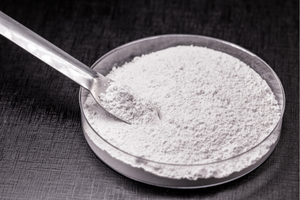Calcium carbonate is an inorganic compound that has a wide range of household and industrial applications. This natural raw material is also known as calcite or carbonic acid calcium salt. What are the features of calcium carbonate? Is it harmful? What role does calcium carbonate play in the soil and what can you produce from calcium carbonate? Here are the answers!

Calcium carbonate: the formula, properties and MSDS
What is calcium carbonate? CaCO3 is a molecular formula that defines a white or transparent mineral in the form of crystals. Calcium carbonate (customary name – calcite) consists of a carbonic acid calcium salt.
What are the features of calcium carbonate? This inorganic compound has the following physical and chemical properties:
- it is poorly soluble in water (when dissolved in water with carbon dioxide, it turns into calcium acid carbonate, i.e.: calcium bicarbonate),
- calcium carbonate decomposes upon heating – it then releases calcium oxide and carbon dioxide (the thermal decomposition of calcium carbonate and the calcination of calcium carbonate are possible at temperatures above 800°C),
- it reacts with acids (for example the combination of calcium carbonate and hydrochloric acid results in a violent release of carbon dioxide).
The compound CaCO3 is also used in pharmacology. What is it? Medical calcium carbonate, also known as Calcium Carbonate, is a medicinal product used for calcium supplementation in the nervous system, kidney, muscle, joint and bone diseases.
Calcium carbonate – use in the construction industry
People have valued this natural raw material, i.e. calcium carbonate for centuries. The water solubility of CaCO3 is poor and the powder is perfect for the production of cement, an essential ingredient of masonry and plastering mortar. Calcite forms high-quality durable binders that last for years whether used outdoors or indoors.
Calcium carbonate for wine and food products
Is it possible to deacidify wine with calcium carbonate? It most certainly is! Homemade wine makers and lovers use CaCO3 in critical situations when the must or final product are too acidic and undrinkable. Once you add a little calcium carbonate, wine regains its natural distinctive taste.
In the food industry, calcium carbonate is known as additive E170. It is used in pastries, chewing gums, some breadstuffs, crisps and cookies.
Calcium carbonate in the beauty industry
Calcium carbonate is obtained in a relatively simple, fast and economic reaction, therefore CaCO3 is also used in the beauty industry. The white and dry powder is used in the production of face powders, baby powders, eye shadows or cosmetic foundations. Due to its whitening effect, calcium carbonate is a popular ingredient of toothpastes.
Calcium carbonate: use – agriculture and animal husbandry
Calcium carbonate is commonly used in agriculture and animal husbandry – a calcium fertiliser enriches impoverished soil, while mixes containing Calcium Carbonate are perfect dietary supplements for animals. The content of calcium carbonate in the soil is an indicator that shows the soil quality – the less CaCO3, the less productive and stable the soil is.
Dairy cattle breeders use calcium bicarbonate for cows to boost lactation and strengthen the gastrointestinal system in animals. Similarly to calcium carbonate used for hens, calcium carbonate used for cattle fosters the overall condition of livestock, preventing acidification, weakening or diseases.
Calcium carbonate: fun facts
The number of various possible uses of CaCO3 is really impressive! At present, calcium carbonate is also used:
- to relieve heartburn or acid stomach,
- as an intermediate in the production of chalk,
- as an ingredient of bleaches,
- as a pigment.
Note the role calcium carbonate also plays in industrial water softening. The process employs a slightly different, yet equally efficient mechanism than the one with chelating agents. If you are looking for high quality water softening agents, check out the product range offered by the PCC Group, including the EXOlat series. For more information, please visit our Product Portal!
Obviously, these are not all the possible options for using calcium carbonate as a raw material. The compound is multi-functional, which results in an infinite number of industrial prospects.
- https://pubchem.ncbi.nlm.nih.gov/compound/Calcium-Carbonate
- https://www.britannica.com/science/calcium-carbonate
